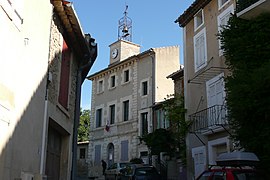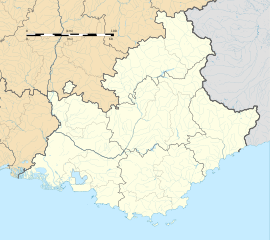| Vaugines | |
|---|---|
| Commune | |
 Town hall Town hall | |
 Coat of arms Coat of arms | |
| Location of Vaugines | |
  | |
| Coordinates: 43°46′47″N 5°24′55″E / 43.7797°N 5.4153°E / 43.7797; 5.4153 | |
| Country | France |
| Region | Provence-Alpes-Côte d'Azur |
| Department | Vaucluse |
| Arrondissement | Apt |
| Canton | Cheval-Blanc |
| Intercommunality | CA Luberon Monts de Vaucluse |
| Government | |
| • Mayor (2020–2026) | Frédérique Angeletti |
| Area | 15.55 km (6.00 sq mi) |
| Population | 556 |
| • Density | 36/km (93/sq mi) |
| Time zone | UTC+01:00 (CET) |
| • Summer (DST) | UTC+02:00 (CEST) |
| INSEE/Postal code | 84140 /84160 |
| Elevation | 211–902 m (692–2,959 ft) (avg. 750 m or 2,460 ft) |
| French Land Register data, which excludes lakes, ponds, glaciers > 1 km (0.386 sq mi or 247 acres) and river estuaries. | |
Vaugines (French pronunciation: [voʒin]; Occitan: Vaugina) is a commune in the Vaucluse department in the Provence-Alpes-Côte d'Azur region in southeastern France.
It lies on the southern slopes of the Luberon Massif. It is a very old and isolated village.
Vaugines has preserved its Provençal style, with its peaceful decorated lanes of traditional stone rural houses. The countryside surrounding Vaugines is wild and typical of Provence, and was chosen by film director Claude Berri for the filming of parts of his adaptions of Marcel Pagnol's novels Jean de Florette and Manon des Sources.
See also
References
- "Répertoire national des élus: les maires" (in French). data.gouv.fr, Plateforme ouverte des données publiques françaises. 13 September 2022.
- "Populations de référence 2022" (in French). The National Institute of Statistics and Economic Studies. 19 December 2024.
This Vaucluse geographical article is a stub. You can help Misplaced Pages by expanding it. |